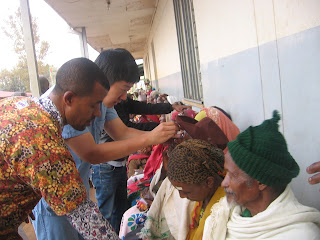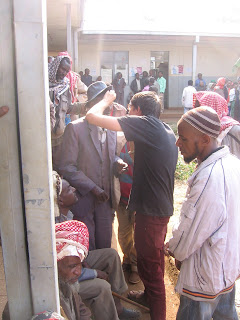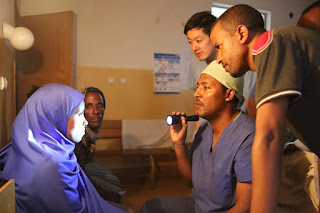"As long as the Lord grants me the hands and courage to continue, I will continue to do this work."
- Dr. Samuel Bora
Dr. Samuel Imana Bora seems as if he were created to do cataract surgery. He appears to perform the surgeries effortlessly, never appearing to struggle, as he makes fine, ultra-precise maneuvers with his fingers in order to remove the cataractous lens impairing the patient's vision and replace it with a new synthetic lens. He has now done over 15,000 manual small incision cataract surgeries (a type of cataract surgery commonly used in the developing world), and can even complete the most straightforward cases in less than 5 minutes!
"In order to do something you must first visualize it in your head," he told me. Dr. Samuel was actually never trained in the manual small incision (MSICS) procedure he uses for cataracts. During residency, he had been trained in a similar technique, called ECCE (extracapsular cataract extraction), which he used as a foundation from which to learn MSICS. He watched videos and poured over other resources to teach himself how to perform the procedure. "I pictured myself doing it over and over in my head before I really operated on a patient's eye."
"Sometimes people think you are a small god after you do surgery on their eyes but you have to remind them you are not," he laughed. "One man after I did surgery on his eye told me, 'You are my father.' I was so touched."
Dr. Samuel and his wife had their third daughter, named Lensa, last year. I joked with him that he loves cataracts so much he named his daughter after the "lens" he removes in cataract surgery. "Actually, it's a traditional Oromo name," he told me. "We gave my first two daughters, Ruth and Deborah, Biblical names. My second daughter Deborah chose the name Lensa for her sister."
Dr. Samuel spends one week a month working for the eye camps, one week working at Aira Hospital in western Ethiopia (the town of his birth), and the remaining two weeks in Addis Ababa, spending time with his wife and 3 daughters and working half-days doing cataract surgeries.
I feel that Dr. Samuel, as well as Sister Evelyn, set the tone for the eye camp team. There's an intangible quality about the team such that I can only describe them as a family. They laugh, joke, tease, even bicker with each other, but at the end of the day you know they have each other's backs. Much of this I would attribute to the calm and reserved caring which Dr. Samuel demonstrates as well as the exuberance and warmth Sister Evelyn radiates. It was good to reunite with Dr. Samuel, Sister Evelyn, and the team, and difficult to leave, but I have a sneaking suspicion that sometime in the future we will meet again.
Much love for these friends










































